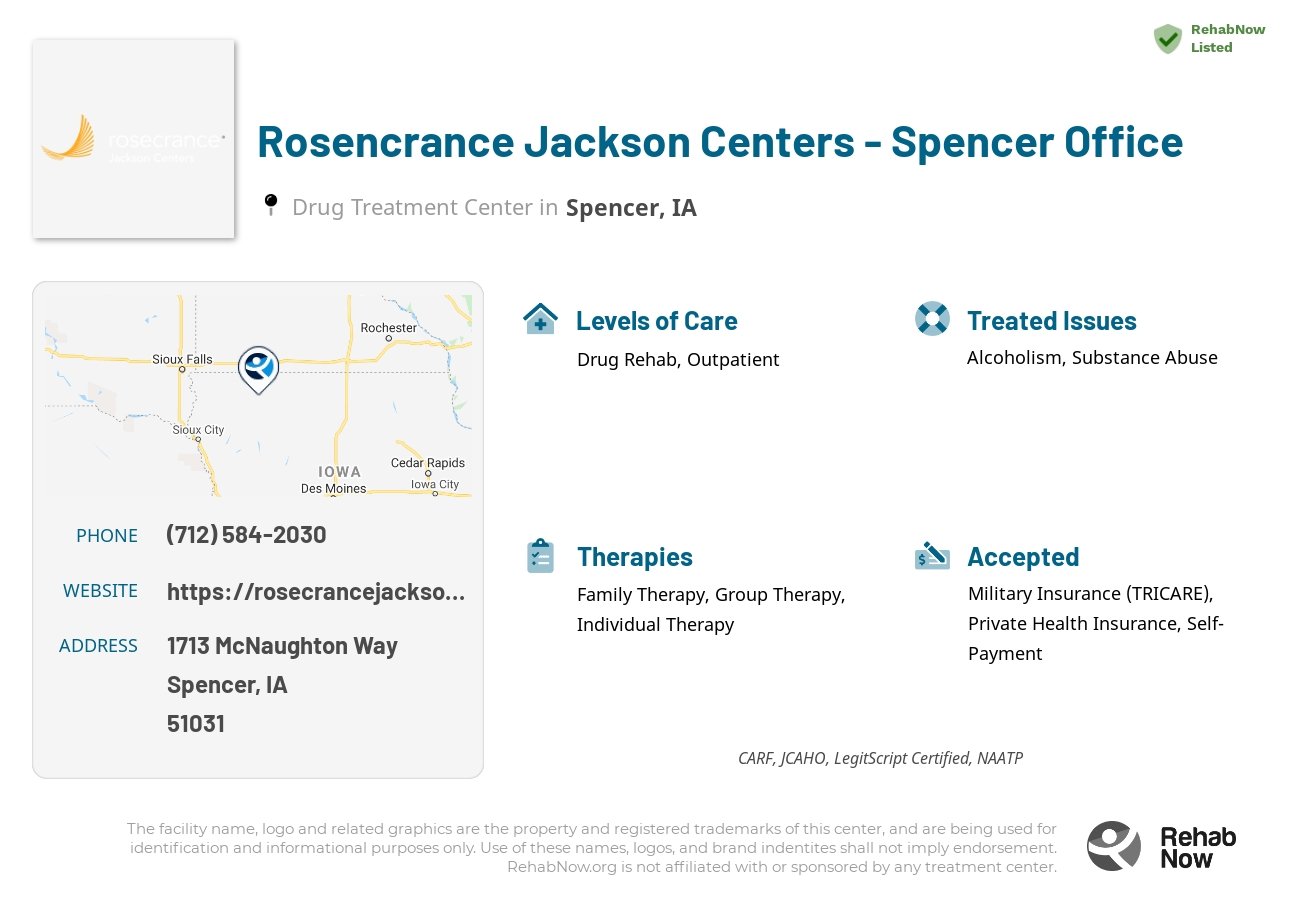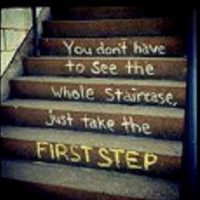Rosencrance Jackson Centers - Spencer Office
Drug Rehab Center in Spencer, Iowa
Rosencrance Jackson Centers - Spencer Office is an accredited addiction treatment center in Spencer, Iowa offering a range of levels of care such as detox, inpatient, outpatient, aftercare, and sober living resources using evidence-based practices and medication-assisted treatment.
About Rosencrance Jackson Centers - Spencer Office in Iowa
Rosencrance Jackson Centers - Spencer Office, situated in Spencer, Iowa, focuses on a crucial mission to aid adolescents and adults battling with alcoholism, drug addiction, and substance abuse. Recognized for its comprehensive, individualized addiction treatment, the non-profit rehab is dedicated to preparing patients and their families for a journey towards recovery.
Accredited by JCAHO, LegitScript, NAATP, and CARF, Rosencrance Jackson Centers – Spencer Office accepts various private health insurance plans, ensuring access to quality care. Their approach integrates evidence-based practices with support services to address the complexities of addiction and mental health issues.
- Individualized Treatment Plans: Tailored to meet the specific needs of each client, enhancing the effectiveness of recovery.
- Comprehensive Levels of Care: Ranging from detox and inpatient to outpatient and aftercare, to support clients throughout their recovery journey.
- Evidence-Based Therapies: Utilizing family, individual, and group therapy, alongside 12-step facilitation, dialectical behavioral therapy, and cognitive behavioral treatment.
Specializing in treating alcoholism, drug addiction, and substance abuse, Rosencrance Jackson Centers at the Spencer Office employs a variety of treatment methods and levels of care, including detox, inpatient, outpatient, and aftercare, which cater to the varied needs of those seeking a path to recovery.
Genders
Ages
Modality
Additional
Accreditations
NAATP

LegitScript

JCAHO

CARF
The Commission on Accreditation of Rehabilitation Facilities (CARF) is a non-profit organization that specifically accredits rehab organizations. Founded in 1966, CARF's, mission is to help service providers like rehab facilities maintain high standards of care.
Conditions and Issues Treated
Substance Abuse Treatment is important when getting sober, as it helps addicts learn the skills they need to live a clean life. There are many different kinds of recovery treatment, including but not limited to medication-assisted therapy, behavioral therapeutic approaches, self-help groups, and counseling. Each treatment has its benefits that help addicts recover.
Counseling can help addicts learn the skills they need to live sober lives. It can be used to treat underlying mental health issues, like depression or anxiety, that could lead to relapse. Counseling can also help people find work, deal with family problems, and learn to manage living without drugs.
Levels of Care Offered
This center offers a variety of custom treatment tailored to individual recovery. Currently available are Aftercare Support, Detox, Drug Rehab, Outpatient, with additional therapies available as listed below.
Detox is an integral part of recovery and often very hard. Detoxification is the process of letting the body remove the drugs in it. It addresses the physical aspect of addiction. Detox from drugs can be unsafe as the patient undergoes withdrawal symptoms that range from headaches, vomiting, body aches to seizures and cardiac arrests. The main purpose of detox is to keep the drug users comfortable as the drugs leave their system.
Quitting cold turkey is not recommended and can lead to many issues. Detox is best done under medical supervision so that a team of experts can monitor the side effects and complications. Detox, alone, does not guarantee sobriety as the underlying psychological issues are not addressed.
Alcohol or drug addiction, or co-occurring disorders, are treated in an outpatient program. The patient must attend therapy and other programs at the facility but can return home each night.
Outpatient treatment allows recovering addicts to live at home while receiving addiction treatment. Outpatients can attend group sessions for a few hours per week. Outpatients may also continue to work full time and study/attend school without interruption if they choose.
The accomplishment of completing a drug or alcohol treatment program is just the first step. Once that is complete, aftercare support comes into play. This includes helping people adjust to life without substances outside of guidelines with assistance like getting sober living accommodations and career counseling and AA/NA programs for those who are struggling between sobriety or want continued help in maintaining it once they have completed their initial rehabilitation at an addiction facility.
Aftercare comprises services that help recovering addicts readjust to normal day-to-day activities while working on specific issues. These problems include psychiatric issues, family problems caused by substance abuse, continuing education pursuits if desired during rehab, etc. These can last up to one year+ depending on what’s needed most urgently upon completion of earlier stages.
Therapies & Programs
Different people react differently to various treatment options. Some drug rehabilitation centers offer individualized treatment that caters to the specific needs of a drug addict. The best treatment option varies on an individual depending on the type of drug abused, life history, medical condition of the person, social circumstances, and the environment they live in now.
When a person enters drug rehab, they usually have anti-drug associations such as withdrawal symptoms, stress, cravings, etc. The first step of drug rehab is to detoxify the body from any residual substances in it. Drug rehabilitation centers usually employ trained medical professionals to help in this process. Usually, the initial detoxification lasts for five days, where the person is monitored under close supervision.
Family therapy sessions typically involve the addict and their family members. During these sessions, a therapist will work with everyone involved to help them understand addiction and find healthy ways of coping without substance abuse.
Some addicts might feel embarrassed about their substance abuse problems. By encouraging family members to attend these sessions, therapists can show addicts that they’re not alone in dealing with addiction. Therapists can also work with family members to help them understand addiction and learn how to offer support and encouragement to their loved one as they deal with substance abuse issues.
Attending group therapy at Rosencrance Jackson Centers - Spencer Office in , is a useful way for those seeking sobriety to realize they aren’t the only one going through it.
This is when a group of people on different recovery phases get together and talk about what they’re going through, their triggers, successes, and failures. This can include alternative types of therapies too! Group therapy may occur on an outpatient or inpatient basis with groups that have no pre-existing relationships outside the session, unlike support groups where everyone already knows each other beforehand.
This type of cognitive-behavioral therapy helps people understand how their thoughts, behaviors, and feelings are interconnected. It can help patients with borderline personality disorder gain control over their actions and stop self-harming thoughts and attempts.
Cognitive Behavioral Therapy is a type of psychotherapy that helps people address the thoughts and behaviors that may have led to their addiction. It also helps change negative thoughts into positive ones and promotes healthy communication between addicts and those around them. CBT is an efficient treatment for individuals suffering from all sorts of addictions.
Cognitive Behavioral Therapy (CBT) focuses on the underlying thoughts and behaviors that caused the problem of addiction in the first place and may cause a relapse. Negative feelings are common in drug abuse disorders, but they can lead to co-occurring disorders if not recognized. CBT involves strategies that help to change the behavior pattern by restructuring negative thoughts into positive ones. It helps to remove these feelings, and it provides long-term benefits. Also, CBT promotes self-awareness, self-control and can be administered as a mono-therapy or as part of combination therapy.
Life Skills Services offered at Drug Treatment Centers assists addicts in their recovery by teaching them healthy coping mechanisms that will aid them in becoming sober, focussing on helping people enter into, and maintaining long-term sobriety. Drug Treatment Centers provide Life Skills Services at varying levels of intensity, specific to the needs and requirements of each patient.
Life Skills Services offered at Drug Treatment Centers assists addicts in their recovery by teaching them healthy coping mechanisms that will aid them in becoming sober, focussing on helping people enter into, and maintaining long-term sobriety. Rosencrance Jackson Centers - Spencer Office in Spencer, Iowa provide Life Skills Services at varying levels of intensity, specific to the needs and requirements of each patient.The benefits of Life Skills Services offered at Drug Treatment Centers:
- Restores hope and empowerment — Helps addicts believe that recovery is possible and instills a new confidence in their ability to achieve a positive, drug-free future
- Enhances family involvement — Encourages families to get involved in the recovery process and supports their understanding and encouragement of healthy behavior.
- Increases patient’s compliance — Helps patients take responsibility for and ownership of their recovery and encourages continued progress
- Reduces relapse rates — Encourages long-term abstinence and emphasizes the importance of establishing sober support systems.
A 12-Step Program is used in treatment to help addicts stop abusing drugs and alcohol. The steps of the program include:
- Making amends.
- Believing in a higher power.
- Taking action to improve their life and admitting that they have a problem with substance use.
A cognitive restructuring step aims to change the way an individual thinks about their addiction to recover and live a life free of substance abuse. This method is extremely popular and very successful for many people who choose it as their treatment option.
Payment Options Accepted
For specific insurance or payment methods please contact us.
Is your insurance accepted?
Ask an expert, call (888) 674-0062
Jackson Recovery Centers Associated Centers
Discover treatment facilities under the same provider.
- Jackson Recovery Centers - Synergy Center in Cherokee, IA
- Jackson Recovery Centers - Le Mars in Le Mars, IA
- Jackson Recovery Centers - Denison in Denison, IA
- Rosencrance Jackson Centers - Sheldon Office in Sheldon, IA
- Jackson Recovery Centers Synergy Center in Cherokee, IA
Learn More About Jackson Recovery Centers Centers
Additional Details
Specifics, location, and helpful extra information.
Spencer, Iowa 51031 Phone Number(712) 584-2030 Meta DetailsUpdated April 15, 2024
Staff Verified
Is Rosencrance Jackson Centers – Spencer Office a LegitScript Verified Treatment Facility?
According to our most recent records, we have found this center to be LegitScript verified.
Rosencrance Jackson Centers - Spencer Office Patient Reviews
There are no reviews yet. Be the first one to write one.
Spencer, Iowa Addiction Information
Iowa ranks 2nd lowest in the nation for illicit drug use, but 12% of its residents are still using these drugs every single year. Methamphetamines account for more than 90% of all drug-related prison admissions in Iowa. Alcohol is the most widely abused substance in the state, with 23% of residents admitting to heavy drinking.
Drug overdoses are the leading cause of accidental death in Spencer, Iowa. In 2013, Spencer had a drug dependence or abuse rate of 6.5 per 1,000 people. This means a big need for drug addiction treatment in Spencer. There are several local drug treatment programs available in Spencer, and these can be a great resource for people who are struggling with addiction.
Treatment in Nearby Cities
- Independence, IA (172.8 mi.)
- Reserve, IA (198.1 mi.)
- Corning, IA (151.6 mi.)
- Urbandale, IA (129.1 mi.)
- Fredericksburg, IA (150.3 mi.)
Centers near Rosencrance Jackson Centers - Spencer Office
The facility name, logo and brand are the property and registered trademarks of Rosencrance Jackson Centers - Spencer Office, and are being used for identification and informational purposes only. Use of these names, logos and brands shall not imply endorsement. RehabNow.org is not affiliated with or sponsored by Rosencrance Jackson Centers - Spencer Office.








